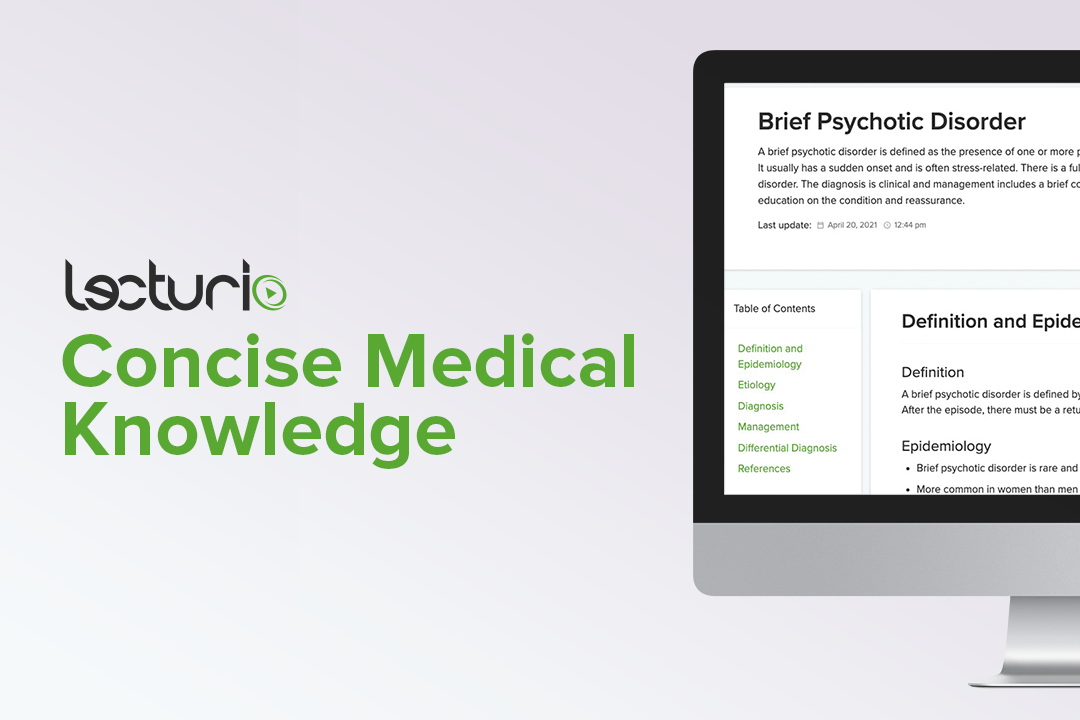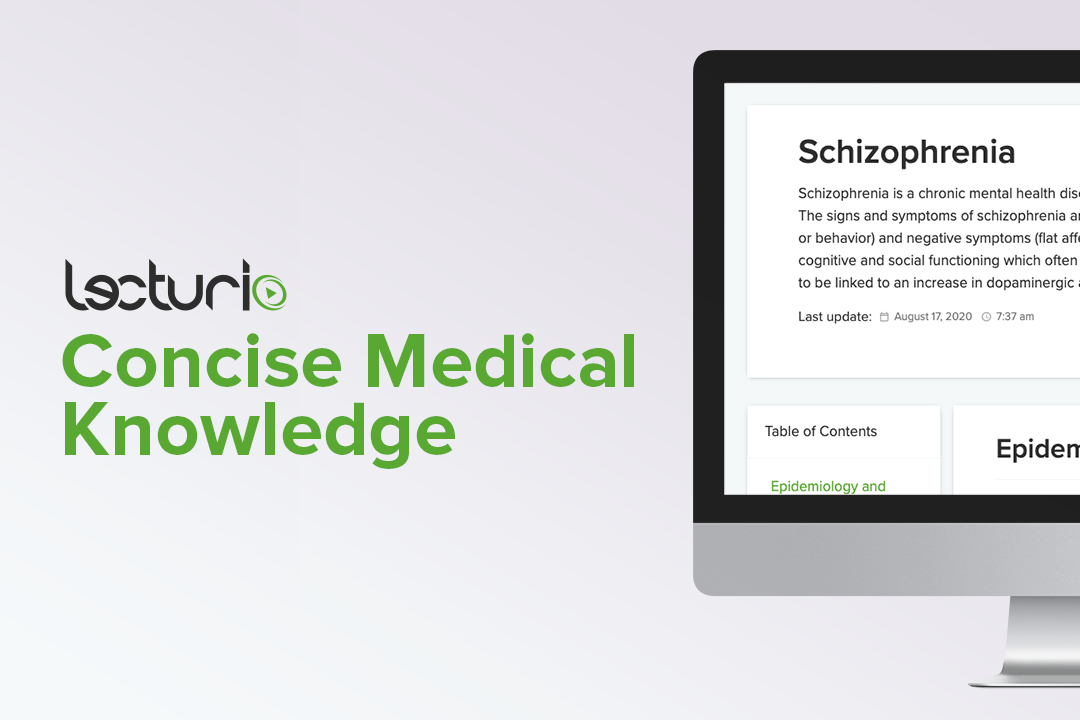Playlist
Show Playlist
Hide Playlist
Psychosis, Delusions and Hallucinations
-
Slides PsychosisDelusions Psychiatry.pdf
-
Download Lecture Overview
00:01 We’re going to talk about psychosis, delusions, and hallucinations now. 00:05 Otherwise known as the symptoms all under the spectrum of disorders that are known as psychotic disorders. 00:11 Let’s start with psychosis and let’s define it. 00:16 Psychosis is a break from reality. 00:19 It involves delusions, perceptual disturbances and also disorganized thinking. 00:28 What are delusions? Well, these are fixed, false beliefs that cannot be altered by rational arguments and cannot be accounted for by the cultural background of the individual. 00:42 There are several delusions. 00:44 We’re going to go through them one by one and I’m going to give you some case examples from my own experiences as a psychiatrist. 00:51 So one delusion is paranoid thinking. 00:54 This is an irrational belief that one is being followed, tracked, or somehow targeted. 01:01 Here’s an example. 01:02 A patient thinks, “The FBI is tracking me and they’re stalking my house.” Another common type of delusion is an idea of reference. 01:12 This is a belief that some event is uniquely related to an individual. 01:18 So consider the patient who says, “Newscasters are directly reporting about me.” This patient believes when they watch TV that people are actually talking about them. 01:31 Another delusion is thought broadcasting. 01:33 This is the belief that one’s thoughts can be heard audibly by other people. 01:39 So a patient may say, “I can hear everything you think without you even saying a word.” Another delusion is a delusion of grandeur. 01:50 This is the belief that one has special powers beyond of those of a normal person. 01:57 So consider the person who says, “I am the smartest person alive. 02:01 I should be president and king of the world.” That would be a delusion of grandeur. 02:07 Delusions of guilt are also common. 02:09 It’s a false belief that one is guilty or responsible for something. 02:15 So consider a patient who says, “I am solely responsible for my aunt’s failing health.” When in fact we know it has nothing to do with that patient. 02:27 Persecutory delusions are also quite common. 02:30 This is the belief that one is being followed or harassed by gangs or other people. 02:36 So a patient may say, “My classmates are all ganging up on me because I have different opinions and therefore they want to hurt me.” Erotomanic delusions are the belief that a famous movie star or someone with a higher stature is in love with that individual. 02:58 A patient may say, “I am convinced that some famous person who loves me.” And somatic delusions are the belief that the body is somehow diseased. 03:11 So consider the case example of a patient saying, “My scalp itches and therefore, I must have incurable head lice.” When in fact there is no obvious explanation for their scalp itching and the doctor has ruled out that they have lice. 03:28 Now, let’s consider hallucinations, another type of a psychotic symptom. 03:34 What exactly are hallucinations? These are perceived senses that are not based in reality. 03:43 It’s different from an illusion, which is a misinterpretation of an existing sensory stimuli. 03:50 So consider this, you’re driving along in your car on a hot day and you perceive a body of water in front of you. 03:58 That would be an illusion. 03:59 It’s not really there, but external reality is giving you the impression that it might be there. 04:05 Hallucinations are different. 04:06 There are actually a lot different types of hallucinations. 04:09 So let’s start with auditory hallucinations. 04:13 In other words, hearing voices. 04:17 Auditory hallucinations are most commonly seen in patients with schizophrenia. 04:23 And there are a lot of different types of auditory hallucinations. 04:28 And it’s really important that with your patient, you not only find out if they’re hearing voices, but you dig deeper and ask more about them. 04:36 So there could be a command voice that they’re hearing. 04:39 This is extremely important because that voice might be telling the patient to hurt themselves or others, something that you need to screen for. 04:48 They may be hearing a running commentary. 04:50 This is important because running commentary voices are very distressing to individuals. 04:56 So this means that a person is hearing something, basically recounting their every move, motion and thought. 05:04 It can be very distressing and upsetting in real time for a patient. 05:09 And then a person may hear one or maybe several voices talking at one time. 05:14 The person who’s hearing several voices at once again is going to be more likely to be disturbed and distressed and they may have a more severe form of a psychotic disorder. 05:25 Visual hallucinations, otherwise known as seeing things, can also occur. 05:31 Visual hallucinations are often seen in an illness called Lewy body dementia and also in drug intoxication, something very important to keep in mind when you’re making your differential diagnosis of the patient presenting with a visual hallucination. 05:47 Olfactory auras in temporal lobe epilepsy are rare but present with classic symptoms, typically described as smelling something burning, and occur in about 1 to 6% of TLE cases. 05:59 They are highly localizing, meaning they point us to a specific brain region the mesial temporal lobe, particularly the amygdala and olfactory cortex. 06:07 When we see olfactory auras, we should think about structural causes. These include tumors, like low-grade gliomas or gangliogliomas, as well as mesial temporal sclerosis, vascular malformations, trauma, and post-infectious gliosis. 06:22 Importantly, tumors are a particularly likely cause of olfactory auras when they do occur. 06:28 And tactile hallucinations are when an individual feels something. 06:32 And when you have a patient complaining of this, you really want to keep in mind that this could be secondary to drug abuse or alcohol withdrawal. 06:42 That summarizes some of the psychotic symptoms that you may be presented with. 06:47 Things like delusions and hallucinations. 06:50 It’s important to keep in mind the different types of these disorders and always remember to dig a little bit deeper to get more of a story from your patient behind what they’re actually experiencing.
About the Lecture
The lecture Psychosis, Delusions and Hallucinations by Helen Farrell, MD is from the course Schizophrenia and Thought Disorders. It contains the following chapters:
- Psychosis/Delusions/Halluzinations
- Delusions
- Hallucinations
Included Quiz Questions
Regarding delusions, which of the following terms best defines the "belief that some event is uniquely related to him/her is"?
- Ideas of reference
- Hallucination
- Thought broadcasting
- Paranoid delusion
- Delusion of grandeur
Mr. Smith irrationally fears that he is being followed by the FBI. Which of the following types of delusional disorder does Mr. Smith have?
- Paranoid delusion
- Somatic delusion
- Delusion of grandeur
- Delusion of guilt
Which type of hallucination is experienced by patients with Lewy body dementia?
- Visual hallucination
- Olfactory hallucination
- Paranoid hallucination
- Somatic hallucination
- Auditory hallucination
Customer reviews
5,0 of 5 stars
| 5 Stars |
|
2 |
| 4 Stars |
|
0 |
| 3 Stars |
|
0 |
| 2 Stars |
|
0 |
| 1 Star |
|
0 |
Very clearly defines terms with great clinical examples (delusion, hallucination, illusion). I feel like most people talk about these terms and assume most people can tell the difference even though they are very similar. It was nice to sit down and actually learn the major differences.
1 customer review without text
1 user review without text







